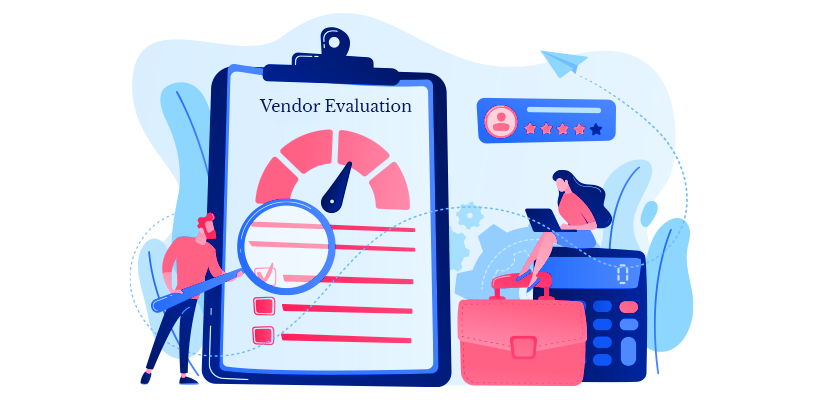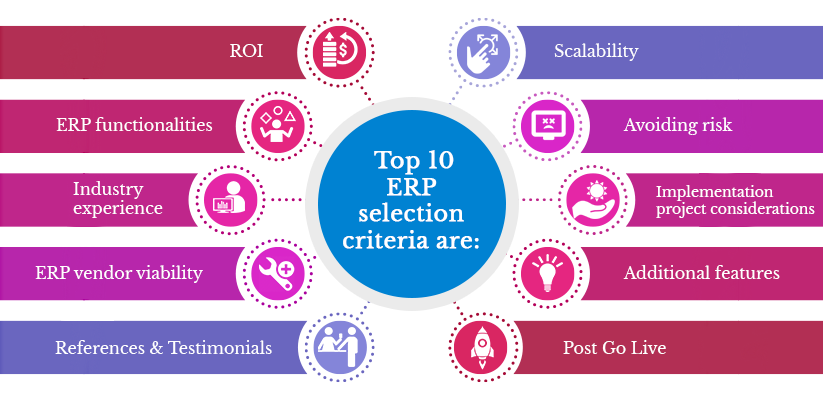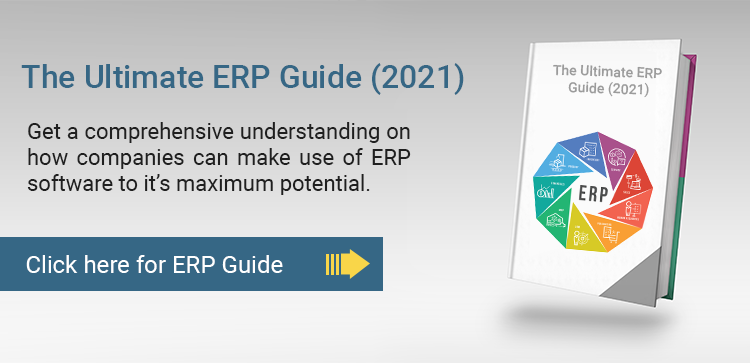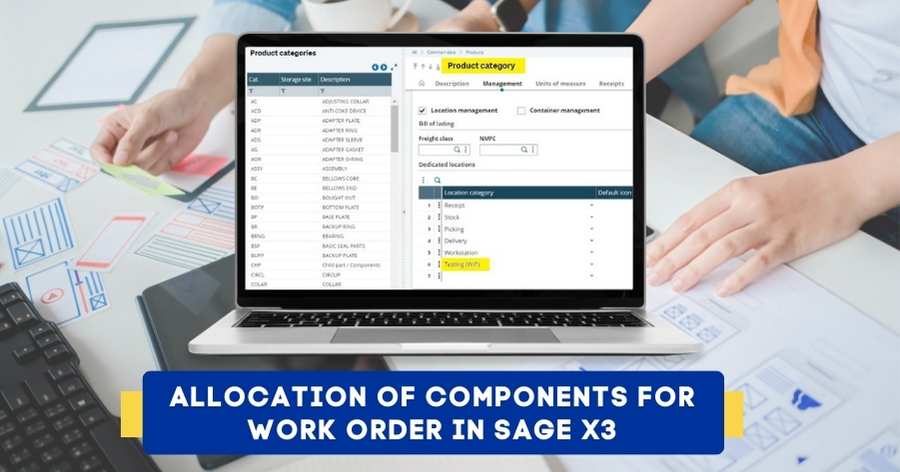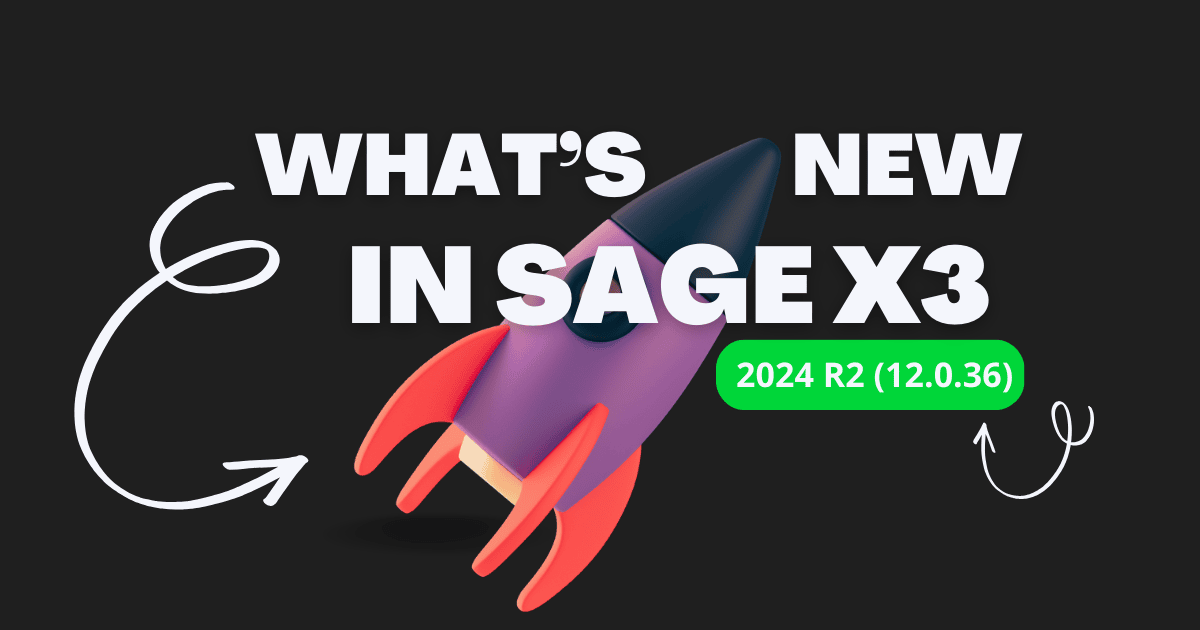Summary: ERP software has become the bedrock of modern-day businesses. Companies across all industries are implementing ERP software for automating their operations. But here comes the tricky part. Preparing a list of selection criteria for finding the right ERP vendor is one of the most challenging elements of ERP implementation. It requires market knowledge, communication with various stakeholders, referring to numerous testimonials, analyzing vendors’ market reputation, and fixing the final price.

What is an ERP system?
Enterprise Resource Planning (ERP) system is a business management software that automates processes. It collects business-critical information, facilitates the free flow of data between various stakeholders, and allows only authorized stakeholders to access data. The most significant benefit of ERP software for ERP vendor is that employees can focus on mission-critical tasks instead of wasting their time in redundant activities like gathering customer information, reconciling data across multiple software, and replying to trivial customer queries.
1. ROI
ERP software can help you save operational costs. Remember the following points while implementing ERP software:
- In what business areas will you save costs after implementing the ERP software? For example, faster financial reconciliation, speedy deal close, automating manual tasks, better inventory management, finding customers with high-buying potential, and estimating changing market demands and customer preferences.
- Can the new ERP software reduce hardware & software implementation costs or software licensing agreement fees?
- This report tells that the average budget per user for ERP is USD 8,265. Therefore you should estimate your ROI one year or five years down the line so that ERP implementation turns out to be a financial success for you.
- What new capabilities will the ERP software help you achieve? Will it allow you to provide excellent customer service, achieve business intelligence reporting capabilities, decrease shipping time, improve e-commerce and warehousing capabilities, or achieve real-time business reporting.
2. ERP functionalities
The ERP market has saturated for ERP vendor. As a result, you will find thousands of ERP systems with varied functions and abilities. So, it would be best if you were well versed with your company’s specific challenges that will help you select the right ERP software.
Here’s a list of questions that you must remember while selecting an appropriate ERP software:
- What features does your current business management solution lack?
- What is the primary reason for purchasing a new ERP system?
- What manual processes do you desire to automate with the new ERP system?
- What business areas do you wish to transform by implementing ERP software?
- What new functions might you require in the future?
Prepare a list of essential ERP features and ask all prominent senior management individuals to examine them.
Also Read: What Is ERP? How Does It Work?
3. Industry experience
ERP software can be divided into two major categories: Generic ERP and industry-specific ERP. Figuring out which ERP software is ideal for your organization is an essential task. First, you must ask the following questions:
- Which industry do you belong to — manufacturing, banking, healthcare, hospitality, automobile, etc.
- Which software vendor would you select — Sage, Microsoft, Infor, Oracle, Netsuite.
- Which ERP implementation partner would you choose?
- What would you prioritize — Implementation fees or vendor reputation & experience?
4. Implementation project considerations
After selecting an appropriate ERP software and the correct implementation partner, you should focus on other aspects during the implementation phase:
- Senior management support: Are you receiving enough support from top management and key leaders of other departments?
- Employee technical expertise: Is your workforce ready to learn how to operate the new ERP system?
- Data migration strategy: Do you have temporary systems where you can safely store your critical business data until the new ERP system is fully installed?
- Maintenance and upgrade: Do you have a separate IT team to maintain and upgrade the ERP system, or do you need a third-party vendor to handle your IT challenges?
5. ERP vendor viability
There are numerous ERP vendors in the market. Remember the following points while selecting one:
- Product viability: How well is your product performing in the market? What is the future scope of your product? How many resources do you invest in research and development for developing new versions of existing products?
- Customer base size: How many clients actively use your product?
- Financial condition: Is your company performing well financially, or do you face difficulties regularly.
6. Additional features
We have already seen that ERP software provides multiple benefits to companies of all sizes and across all industries. But it also has a broad range of additional features that you should remember while selecting one for your company, such as:
- UI/UX simplicity
- Security from cybercriminals
- Can integrate with other business management solutions
- Business Intelligence
- Customizable
- Can forecast future sales
- Minimal downtime
7. Scalability
ERP implementation process doesn’t end with the deployment process. Few years down the line, you might want new features based on the emerging market needs and changes in customer preferences. Do you think your present ERP software can deal with future challenges?
If not, you might need customizations in your existing ERP. This is where scalable ERP software comes into the picture. It fits well with your current business plans and with your future strategy too. A scalable ERP software can mesh with your organization’s strategic direction, whether entering into new markets or merging and acquiring another entity.
8. Avoiding Risk
Risk management plays a vital role while implementing enterprise-level business management solutions like ERP and CRM systems.
Here’s a list of factors that have a significant impact on the risk quotient of the ERP implementation process:
- Selecting the right third-party vendor.
- Vendor viability
- Price
- Support from senior management
- Project planning
It would help if you began by preparing a list of crucial business processes fundamental to your company’s operations. It should also contain information regarding external integrations and compatibility with other systems. Moreover, end-user training and change management are also two key areas that help manage risk, so noting them down in the list would make sense.
Now, refer to this list throughout the ERP selection and implementation process to reduce the risk quotient.
9. References & Testimonials
Feedback plays a vital role while selecting the right ERP software. Talk with your business partners, colleagues, and other market players to discover which ERP software would be the best for you. Don’t limit your research to social media and the internet. Visit stores and talk face-to-face with people to select the right ERP software that fits well with your organizational needs.
10. Post Go Live
How would you handle the challenges that arise after the ERP implementation process is complete?
Do you have an in-house IT team to look after that?
Or would you depend on an external partner?
Prepare a well-thought plan to handle your ERP implementation process to maximize your ERP investments.
STAY UPDATED
Subscribe To Our Newsletter
At Sage Software Solutions (P) Ltd., we are home to world-class ERP software and CRM software that will solidify your business tech support fundamentals and enable you to build a customer-centric organization. You can also write to us at sales@sagesoftware.co.in.
Disclaimer: All the information, views, and opinions expressed in this blog are those of the authors and their respective web sources and in no way reflect the principles, views, or objectives of Sage Software Solutions (P) Ltd.
